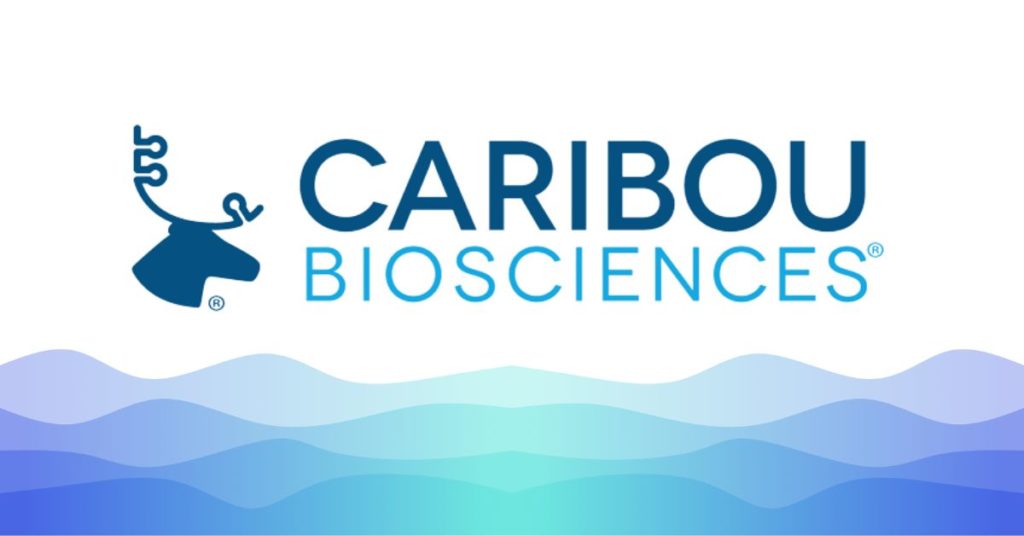RMAT and Fast Track designations follow CB-010’s durable complete responses at dose level 1 in the ANTLER Phase 1 trial
CB-010 is the 1st allogeneic CAR-T cell therapy in the clinic with a PD-1 knockout
BERKELEY, CA, Nov. 29, 2022 — Caribou Biosciences, Inc. (Nasdaq: CRBU), a leading clinical-stage CRISPR genome-editing biopharmaceutical company, today announced that the U.S. Food and Drug Administration (FDA) has granted CB-010 Regenerative Medicine Advanced Therapy (RMAT) designation for relapsed or refractory large B cell lymphoma (LBCL) and Fast Track designation for relapsed or refractory B cell non-Hodgkin lymphoma (r/r B-NHL). CB-010, an allogeneic anti-CD19 CAR-T cell therapy with a PD-1 knockout, is being evaluated in the company’s ongoing ANTLER Phase 1 clinical trial in patients with r/r B-NHL, which can enroll three LBCL subtypes: diffuse large B cell lymphoma (DLBCL), primary mediastinal large B cell lymphoma (PMBCL), and high-grade B cell lymphoma (HGBL). CB-010 is the first allogeneic anti-CD19 CAR-T cell therapy in the clinic with a PD-1 knockout, a genome-editing strategy designed to improve the persistence of antitumor activity by limiting premature CAR-T cell exhaustion.
“RMAT and Fast Track designations for CB-010 are important recognitions of the significant unmet patient need for an off-the-shelf cell therapy in the treatment of aggressive B-NHL,” said Rachel Haurwitz, Ph.D., Caribou’s president and chief executive officer. “Through genome editing with our precision CRISPR chRDNA genome-editing technology, CB-010 has been designed with a PD-1 knockout strategy to improve the persistence of antitumor activity by limiting premature CAR-T cell exhaustion. In our ANTLER Phase 1 trial, 3 of 6 patients treated with CB-010 at dose level 1 maintained a durable complete response at 6 months. We are encouraged that CB-010 has demonstrated early potential as an off-the-shelf cell therapy that may meaningfully rival autologous cell therapies.”
Encouraging safety data and antitumor activity for CB-010 at dose level 1 (40×106 CAR-T cells) have been reported from the ANTLER trial. As presented at the European Hematology Association (EHA) 2022 Congress, 6 of 6 patients (100%) achieved a complete response (CR) as best response after treatment with CB-010 at dose level 1 (40×106 CAR-T cells). Subsequently, at 6 months, 3 of 6 patients (50%) maintained a CR. Fifteen months is the longest CR maintained to date, observed in the first patient dosed in the ANTLER trial. CB-010 was generally well tolerated at dose level 1.
Both RMAT and Fast Track designations are dedicated programs designed to expedite the development and review processes for promising therapeutic candidates intended to address an unmet medical need in patients with serious conditions. These designations provide important benefits in the drug development process and are designed to facilitate and expedite development and regulatory review, including providing eligibility for Priority and Rolling Reviews, and Accelerated Approval, if relevant criteria are satisfied.
About CB-010
CB-010 is the lead product candidate from Caribou’s allogeneic CAR-T cell therapy platform and is being evaluated in patients with relapsed or refractory B cell non-Hodgkin lymphoma (r/r B-NHL) in the ongoing ANTLER Phase 1 trial. CB-010 is an allogeneic anti-CD19 CAR-T cell therapy engineered using Cas9 CRISPR hybrid RNA-DNA (chRDNA) technology to insert a CD19-specific CAR into the TRAC gene and knock out PD-1 to boost the persistence of antitumor activity. CB-010 is the first allogeneic CAR-T cell therapy in the clinic with a PD-1 knockout. CB-010 has been granted Regenerative Medicine Advanced Therapy (RMAT), Fast Track, and Orphan Drug designations. Additional information on the ANTLER trial can be found at https://clinicaltrials.gov/ using identifier NCT04637763.
About Caribou’s Novel Next-Generation CRISPR Platform
CRISPR genome editing uses easily designed, modular biological tools to make DNA changes in living cells. There are two basic components of Class 2 CRISPR systems: the nuclease protein that cuts DNA and the RNA molecule(s) that guide the nuclease to generate a site-specific, double-stranded break, leading to an edit at the targeted genomic site. CRISPR systems are capable of editing unintended genomic sites, known as off-target editing, which may lead to harmful effects on cellular function and phenotype. In response to this challenge, Caribou has developed CRISPR hybrid RNA-DNA guides (chRDNAs; pronounced “chardonnays”) that direct substantially more precise genome editing compared to all-RNA guides. Caribou is deploying the power of its Cas12a chRDNA technology to carry out multiple edits at high efficiency, including multiplex gene insertions, to develop CRISPR-edited therapies.
About Caribou Biosciences, Inc.
Caribou Biosciences is a clinical-stage CRISPR genome-editing biopharmaceutical company dedicated to developing transformative therapies for patients with devastating diseases. The company’s genome-editing platform, including its proprietary Cas12a chRDNA technology, enables superior precision to develop cell therapies that are specifically engineered for enhanced persistence. Caribou is advancing a pipeline of off-the-shelf CAR-T and CAR-NK cell therapies for the treatment of patients with hematologic malignancies and solid tumors.
For more information about Caribou, visit www.cariboubio.com. “Caribou Biosciences” and the Caribou logo are registered trademarks of Caribou Biosciences, Inc.
